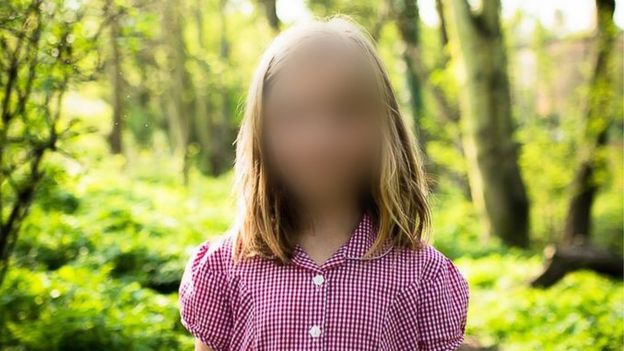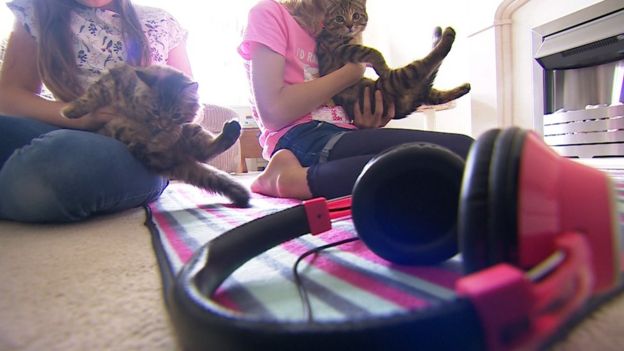For most parents, their child’s move to secondary school is a big moment which requires planning, even more so for those with transgender children. The Victoria Derbyshire programme has been following two of the UK’s youngest trans children for the last two-and-a-half years.
“I won’t mention it, but if it comes up I will be honest. I’m not going to say, ‘Guess what, I’m trans’, but if someone mentions it I will say I am, because I am,” says Jessica.
The 10-year-old’s friends do not really mention the fact she has transitioned from living as male to female, a fact she prefers. She just wants to be treated “like a normal girl”.
We first met “Jessica” and “Lily”, who is now nine, in January 2015. We are not using their real names.
Jessica’s stepfather “Alex” – who transitioned from living as female to male – says he is “taken aback, but quite proud” that she plans to be open when she moves to her next school in just over a year’s time.
While it is not without problems, he says that approach avoids having to worry about whether someone will find out, which can be stressful for both the child and siblings who could accidentally “out” them.
“It’s a big secret to keep. It just puts so much pressure on them. And so if somebody does feel that they can sort of be open about it, I personally I think that’s a better way,” he says.
Find out more
 Image copyrightJESSICA’S PARENTS
Image copyrightJESSICA’S PARENTS
Transgender is a term used to describe a person who does not identify as the gender that was assigned to them at birth – they may wish to be seen as a different gender or no gender at all.
The UK’s only centre specialising in gender issues in under-18s is the Tavistock and Portman NHS Trust, which is based in London and has clinics across the UK.
In the last two years, the number of children aged 10 or under who were referred to the NHS because they were unhappy with their biological gender has risen from 87 to 216, including 32 aged five or under over the last year.
It is something psychologists at the trust admit surprised them.
They say it is impossible to know for sure why so many more children are being referred, but that it is clear there is much greater awareness and acceptance in society for young people to be able to talk about questioning their gender.

Lily’s mum “Jen” says the search for the right secondary school began two years ago, before her older son started. She asked how it would support trans children, so she knew it could help both of her offspring.
At the time, the school had not encountered any other transgender children, but said it was happy to build something into the curriculum to educate the other pupils.
The school already has two children transitioning from male to female. “It’s reassuring that they’ve got a bit of experience of it and getting their heads around it,” she says.
‘Old news really’
Lily, who still has two years left at primary school, is “very happy and doing well”, her mum says.
“[She’s] possibly more confident and just seems more relaxed in herself. At school it doesn’t seem to be an issue any more, it’s just a kind of old news really.”
But Lily says her fellow pupils are not always kind. “There was a person, they said, ‘You won’t be a very good woman, you should just be a man’, and that really upset me.”
Jessica went through a more difficult period at the end of last year as hormones began to kick in, her parents said.
“Occasionally she’ll bring up, ‘When I grow up I’m going to live alone, because no-one will want to live with me because I’m trans, I won’t ever get a boyfriend’,” says mum “Ella”.
“They should be children, they should just be allowed to get on with stuff. I just want everything to go smoothly and normal for her, as normal as life is,” she adds.

Jessica’s parents say she felt much better after speaking to a consultant at the Tavistock clinic, who reassured her that the physical changes linked to puberty were some way off.
Younger transgender children can receive treatment on the NHS, but at that age it takes the form of counselling and support sessions.
Medical intervention is not considered until they approach puberty, when hormone blockers might be offered.
Blockers pause the physical changes associated with puberty, giving the young person time to think for much longer about their gender identity.
At around the age of 16, a patient can then take cross-sex hormones, which would mean they go through the puberty of the gender that they feel that they are.
Ella says she worries about whether they will have the money to pay for private treatment if Jessica wants hormones earlier.
“I’ve got friends whose children need it for their own mental health, their hormones earlier. So I am aware that Jessica may need them sooner.”
Jen adds: “It’s hard being a teenager anyway, (let alone) to have to wait until you’re 16 for your body to develop. It’s upsetting to think all her peers are going to be talking about periods and developing breasts and wearing bras and things and she will be waiting – a really tough thing for her to go through.”
 Image copyrightLILY’S PARENTS
Image copyrightLILY’S PARENTSThe most crucial thing for both sets of parents is to support their children as they grow up and ensure that they have the skills to handle the challenges ahead.
“The research evidence shows that teenagers and young people who are trans who have had that support, had the treatment that they need, have the support from families and schools have got the same or better mental health than normal non-trans young people,” says Jen.
She says the families are fortunate that they are going through the experience now.
“Even five years ago things were so different. There were no blockers, that must have been so hard for families going through what we’re going through,” she says.
For more information and support:
NHS page with general information.
The Tavistock and Portman NHS Foundation Trust – provides the only NHS gender identity service for under-18s.
The Gender Identity Development Service – the official website for the service, offering information and resources
Mermaids gives support for children, young people and their families
Gendered Intelligence gives support to young people
Gender Identity Research & Education Centre
http://www.bbc.co.uk/news/education-40814995
